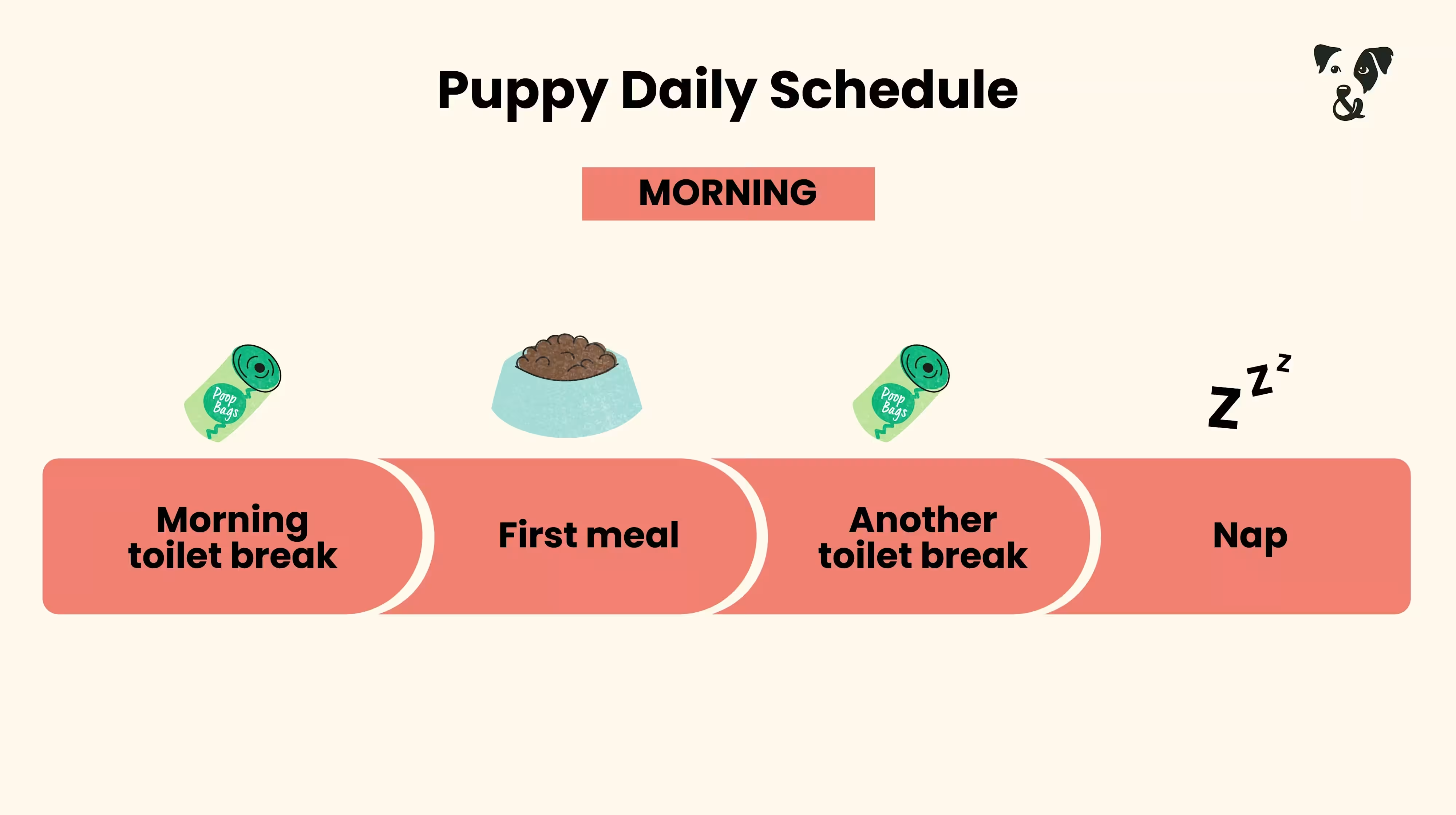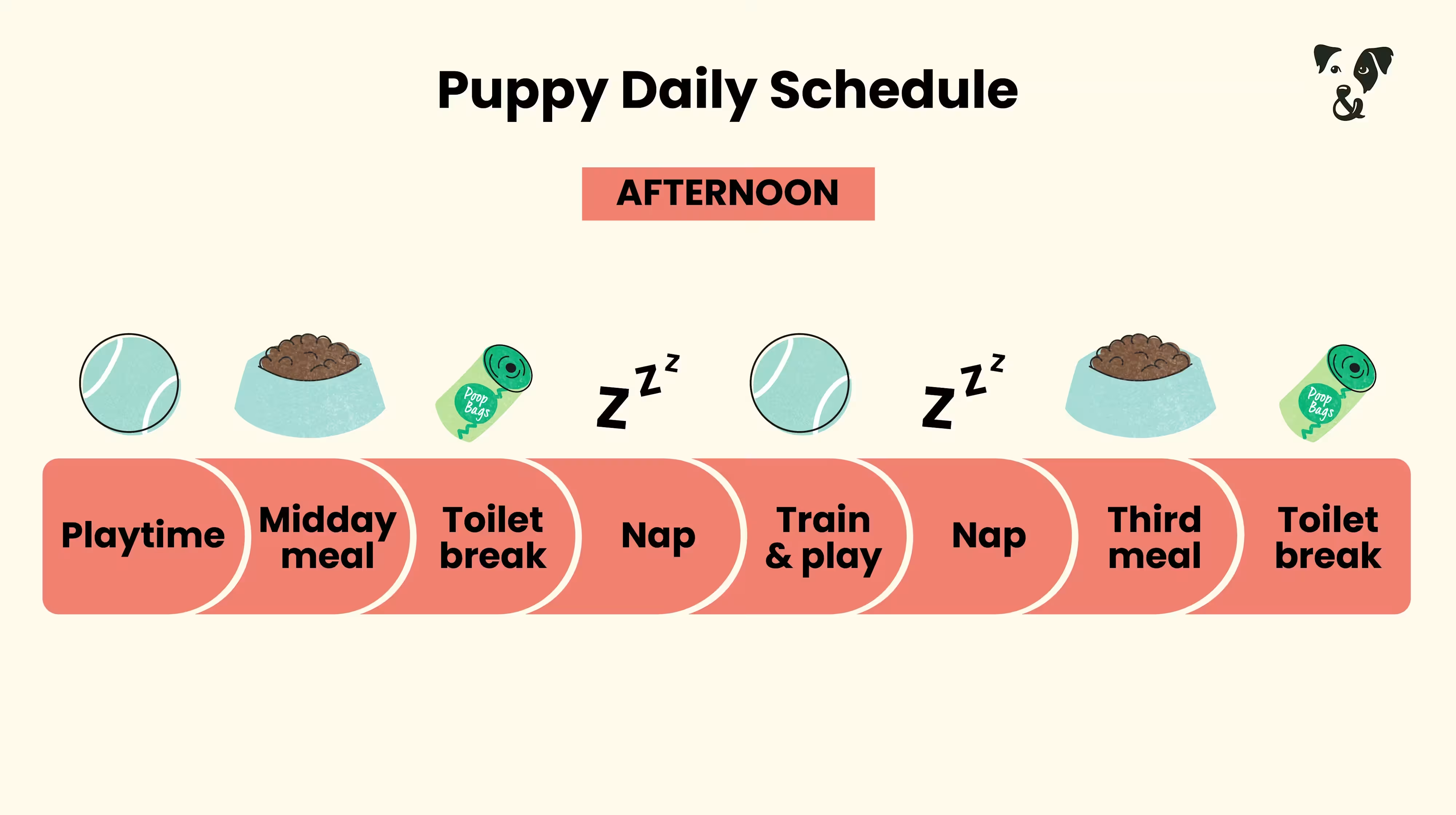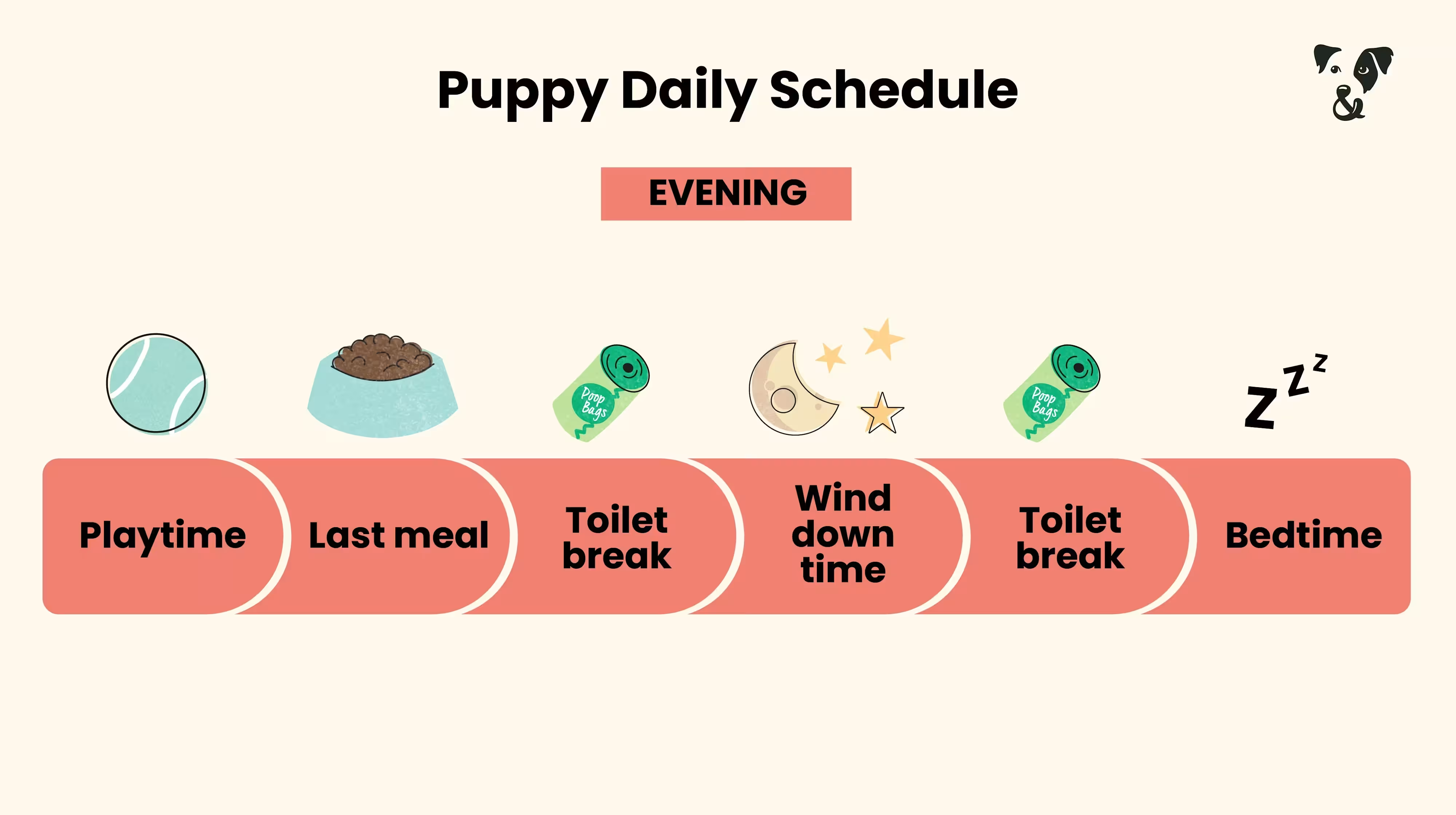The day has FINALLY arrived - your new puppy is home with you! And once all the happy tears and unbearable excitement has subsided, the realisation may kick in that this little furry bundle of joy is now your responsibility to raise. But worry not, all you need is a good puppy routine!
Like many of us, puppies thrive on a routine, and building one up around their age and needs will give them the best possible start - making new puppy life a little easier to manage.
But what’s a good starting routine for a puppy? Well of course, we pooch experts have the answers. Read on for our recommended sample puppy routine, and all the expert tips and tricks you need to keep a solid puppy daily schedule - that’ll help along their training and development.
Why is routine important to puppies?
If you’ve just brought your puppy home, odds are they’re aged anywhere between 8 to 16 weeks. This period of a pup’s life is crucial as they begin to navigate the world around them - soaking up new experiences which help mould the way they think and learn.
Giving young puppies solid daily routines helps them settle into your home, can help reduce stress and anxiety, and teaches them what to expect daily (with no surprises that might throw them off).
This is a great way to kickstart their new life with you, and teach them what their new life at home will look like.
Your puppy’s daily schedule
As your puppy grows and changes, so will their daily routine! The majority of it will end up feeling like deja vu, but you’ll start to notice that you’ll make little adaptations as they grow, learn and develop.
So, what should a typical day look like for your growing pup?
Morning

Morning toilet break:
Whether they’re 8 weeks old or 6 months old, showing them that they go out for a toilet break first thing will get them into the habit of doing so when they’re older - helping to avoid any accidents when they can eventually hold onto their pee or poop throughout the night.
For an 8-week-old pup, you may have spent the night getting up on the hour to soothe them during crate training , or taken them out for a toilet break since at this age, they can’t hold it for very long.
It’s still advised to stick to the routine of going out first thing, even with young puppies. Kicking off the habit at the earliest age possible will help make toilet training easier down the line.
First meal: The most important meal of the day!
Kicking off the day with a bowl of healthy puppy food is ideal for a pup of any age.
Despite the number of times you feed them a day changing as they grow older, starting the day off with a nutritious meal will give them all the energy they need to take on the day ahead.
8-week old puppies eat around 4 times a day, but smaller portions at a time (usually between 30-60g). This can either be wet or dry , but it’s often advised to soften crunchy kibble with warm water so it’s easier on their baby teeth.
To know exactly what you should be feeding your puppy; considering their age, weight and size - check out our very own Puppy Feeding Guide !
Another toilet break: All that food’s got to go somewhere! Even if they’re not showing signs of needing the toilet, it’s always good to try. That said, younger puppies will need to go not long after eating.
Eventually, they’ll recognise that post-feeding is toilet time! And you can carry on with the next hour knowing little accidents are unlikely.
Older pups (16 weeks and up) need to go to the toilet less often, so the amount of potty breaks they need in a day will decrease as they grow.
Nap: It’s not going to take much to tucker out a young puppy, with pups needing up to 20 hours of sleep a day. So, just to conserve energy, you may want to wind things down a bit to encourage snoozing.
The amount of naps puppies need also reduces with age, so this will change as your pup grows.
Puppy
Vet-recommended food and supplements, perfect for healthy pup growth and development
-

 from
fromCurrent price: £8.99
Puppy Complete Dry Superfood -

 from
fromCurrent price: £2.49
Puppy Wet Food -

 from
fromCurrent price: £3.99
Puppy Beef Jerky Training Treat -

 from
fromCurrent price: £35.49
Puppy Complete Bundle -

 from
fromCurrent price: £10.49
Meaty Treats Taster Pack -

 from
fromCurrent price: £11.49
Salmon Oil For Dogs -

 from
fromCurrent price: £3.99
Calming Probiotic Meaty Treats -

 from
fromCurrent price: £3.99
Dental Probiotic Meaty Treats -

 from
fromCurrent price: £5.99
Health & Digestion Bone Broth -

 from
fromCurrent price: £5.99
Calm & Relaxed Bone Broth -

 from
fromCurrent price: £3.99
Peanut Butter Probiotic Nutty Treats -

 from
fromCurrent price: £15.99
Dental Powder For Dogs
Afternoon

Playtime: Then when they’re awake and well-rested, it’s time to burn all the energy off again! Playtime is a crucial part of a puppy’s day and can help with development and bonding.
Playtime can look different each time, whether you want to focus on mental stimulation , enrichment , training or just plain tug of war.
Mid-day meal: Exerting all that energy will help puppies work up an appetite. The average puppy will need a meal 3-4 times a day up to the age of 6 months.
Once they reach this age, their portion sizes should increase but the amount you feed them should reduce to twice a day.
Toilet break: Puppies will often need to have a toilet break not long after they’ve eaten, so you should always make it a habit to practice toilet training once mealtime’s over.
Nap: With a full belly and the day half over, it’ll be time for another recharge. For puppies older than 16 weeks (who’ve had their necessary vaccinations), this could be a great time for leash training, or a quick walk around the neighbourhood for some essential socialisation and exposure training.
Training/playtime: This is a great time to play more with your pup and work on some basic training. This can include tricks like sit, paw, leave and stay - all of which can assist in keeping your pup’s focus during other tasks.
Need a high-reward treat to really get your pup’s attention? For those older puppies aged 12 weeks and up, try our range of meaty , fishy and nutty treats ; available in a wide range of flavours and functions from calming to digestion.


Puppy Beef Jerky Training Treat
Our grain free puppy jerky is the perfect high-value training treat, for pups learning the ropes. Made with 90% Fresh Beef, it helps retain focus and reward good behaviour.
-
High-value training treat
-
Puppy-friendly
-
90% Fresh Beef
Current price: £3.99
Puppy Beef Jerky Training Treat
Nap: All that training would’ve tired out your young pup! Slowing things down and settling them for another nap will help conserve energy and prepare them for the rest of the day.
Mid-afternoon meal: Young pups are constantly burning energy through learning and playing, so they must be getting all the nutrients they need - making this a great time for their third meal of the day.
Toilet break: Keeping up the habit of having a toilet break after meals brings another opportunity to practice toilet training.
Evening

Playtime: As we know, playtime is a crucial part of a young pup’s life, so squeezing in as much one-on-one time with your pup is important!
As they get older, this time can be turned into more adventurous activities like bigger and longer walks after their necessary vaccinations, exposure training and socialisation.
Last meal: For a pup younger than 6 months, their day should include a fourth and final portion of food for the day. This is on top of treats throughout the day, to reward training and encourage positive reinforcement!
Find out how many treats your puppy should be having during the day to stick to a healthy, beneficial diet by exploring the treat section on our Puppy Feeding Guide.
Toilet break: This certainly won’t be the last toilet break of the day! But it’s important to keep up the routine of encouraging your pup to pee or poop after eating, to avoid accidents inside the house.
Wind down time: Where earlier this would have been a time to play, this time should now be taken to wind down. Whether snuggling on the sofa, tidying toys away for the day or just sharing the love, you should be doing everything to prepare them for a good night’s sleep.
This also might include crate training where you spend time introducing them to their crate and showing your pup that it’s a relaxing space made for snoozing.
For help, tips and tricks on crate training your puppy, explore our guide ‘ How to crate train a puppy ’.
Toilet break: Just like you want your puppy to get into the habit of having a toilet break once they get up, the same can be said for before bed! This will especially come in handy when they’re old enough to hold their bladder throughout the night.
That said, younger pups (those just over 8 weeks) will need to pee almost every hour throughout the night. However, this will be a temporary part of the routine while they’re potty training - don’t worry!
Bedtime: Full tummy, empty bladder and satisfied from a day of fun - it’s time for bed! Whether you use a crate, playpen or decide that your pup will sleep in your room, this is a great time to continue training to set them up for success as they grow into an adult dog.
Night time with your pup can be a whole new ball game, so make sure you’re prepared, especially with the expert advice found in our article ‘ The first night with your puppy ’.
For extra help, expert trainer Jon has swooped in and brought to us his top tips and tricks on nailing down your puppy's evening routine.
And that’s your puppy’s day done - ready to start it all over again the next day. Raising a puppy is certainly not all cute puppy pictures and cuddles.
It can be hard work! But with the right approach, guidance, support and a whole lotta patience, you can help your pup grow up to be the best adult dog. For expert training, vet advice and general puppy support, be sure to explore our full Puppy Hub .




